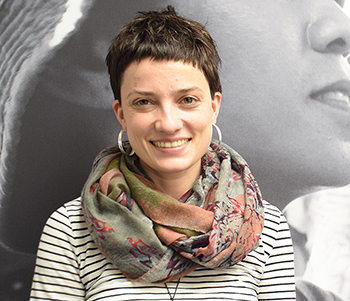
Katja Schatte
Just over halfway into her month-long residency at USC Shoah Foundation Center for Advanced Genocide Research, 2016-2017 Greenberg Research Fellow Katja Schatte has already surpassed her expectations about what she would discover in the Visual History Archive.
Schatte sat down for a Facebook Live interview about her research and her fellowship at the Center. She will give a public lecture about her work on March 7 on the USC campus.
A PhD candidate in history at the University of Washington and a native of Dresden, Germany, Schatte is working on a multidisciplinary study of Jewish life in East Germany in the late 1970s and early 1980s, and after the fall of the Berlin Wall. She is also interested in the “transgenerational memory” of Jews who lived in East Germany, particularly Berlin, from the immediate aftermath of the Holocaust to the present day.
She has found 70 testimonies in the Visual History Archive of Holocaust survivors who discuss life in East Germany, and is comparing these testimonies with interviews Schatte has conducted herself as well as interviews in other archives. Putting together these various accounts is like a puzzle, she said.
For example, Schatte recently interviewed a third-generation Holocaust survivor in Germany who wrote a book about her grandfather, who was killed by Nazis. In the Visual History Archive, Schatte found the testimony of the woman’s mother – the generation in between granddaughter and grandfather.
“I really get to have a different perspective on that family’s story which is what I’m really interested in, this transgenerational aspect,” Schatte said. “How do different generations talk about the family’s history at different points in time?”
She is also interested in artwork that survivors show in their testimonies, and accounts of survivors who continued to engage with their history decades after the Holocaust up to the present day, as writers, journalists, artists, and teachers. It’s important to Schatte to acknowledge and utilize work that has come before her and that may not have been recognized.
“I want to be conscious about the work, the intellectual labor that has already been done by people over generations which oftentimes is not in the public eye because of that stigma that still comes with someone having lived in the GDR [German Democratic Republic],” she said.
As she continues to work on various aspects of her dissertation project, including digital and artistic collaborations, Schatte hopes her work can ultimately shine a light on the Jewish experience in East Germany – not just according to government documents, but real accounts from the people themselves.
“My goal is for people to get a more nuanced view of Jewish life in East Germany specifically in the late GDR, but also [understand] that this is not history,” Schatte said. “It keeps on living in the present.”